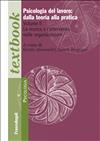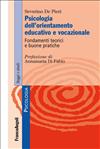
Vol. II. La ricerca e l'intervento nelle organizzazioni
Insieme al primo volume, in questa seconda parte il manuale fornisce una panoramica esaustiva delle principali e attuali tematiche relative alla psicologia delle organizzazioni e all’ambito applicativo (formazione, selezione e valutazione delle persone, assenteismo, goal setting e counseling).
cod. 1240.1.69

